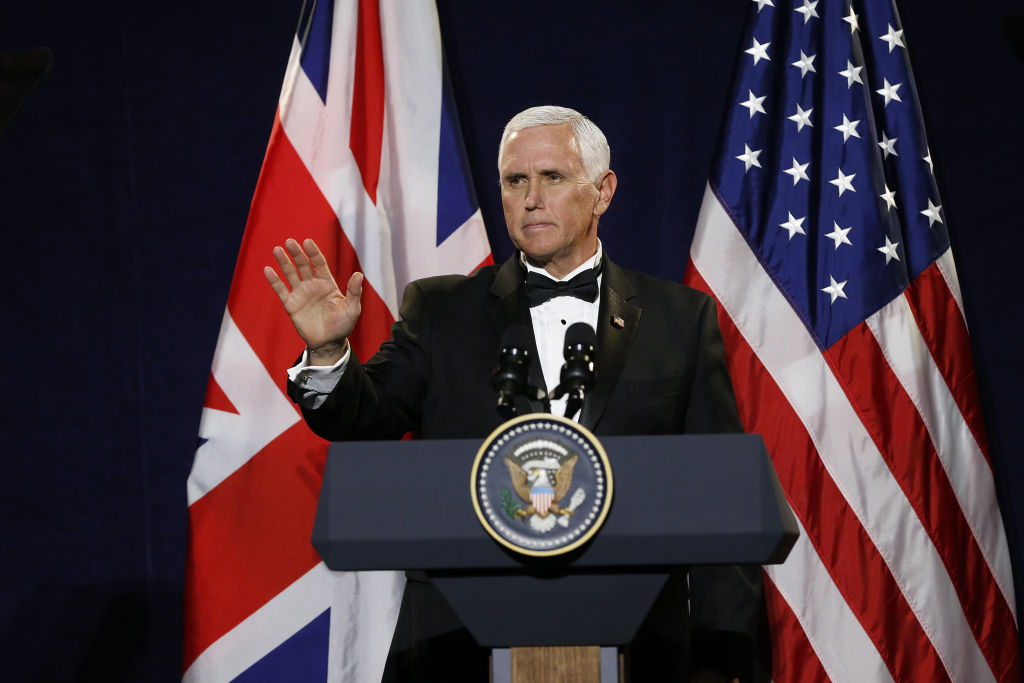
London is a retired partner for the law firm Paul, Weiss, Rifkind, Wharton & Garrison and the author of The Client Decides; he was a principal lawyer for Vice President Spiro Agnew.
The Constitution provides for impeachment of “The President, Vice President and all Civil Officers…”
The current House impeachment inquiry is focused on President Trump’s apparent effort to persuade a foreign government to interfere in the 2020 presidential election–specifically, to press Ukraine’s President Volodymy Zelensky to investigate the leading Democratic contender, Joe Biden. Trump is still the central U.S. civil officer in the spotlight, but now it seems Vice President Pence may be implicated as well.
While the President claims his July call with Zelensky was “perfect,” the House Intelligence Committee Chairman Adam Schiff describes it as a “shakedown,” and a majority of the House of Representatives now support an impeachment inquiry. Pence, meanwhile, has defended the President, saying, “I think the American people have the right to know if the Vice President of the United States or his family profited from his position as vice president during the last administration.”
While we do not know precisely what Pence knew about Trump’s conversation with Biden or what he said to Zelensky when they met last month, there’s a lot we do know – and it doesn’t look good. Pence was not on the call in which Trump asked Zelensky for a “favor” — a Ukrainian investigation of Joe Biden and his son Hunter — at a time when the U.S. was withholding hundreds of millions of dollars of aid, but one of his top advisers was, and according to the Washington Post, “the vice president should have had access to the transcript within hours.” It was in this context that he flew to Poland in September and reinforced to Zelensky the Trump message that U.S. aid was still being withheld because of concerns about “corruption.”
In the nations’ history, two Presidents have thus far been impeached, but not convicted. No Vice Presidents have ever been impeached.
But not for trying.
In 1973, I was a member of Vice President Spiro Agnew’s legal team defending him against bribery charges being considered by the U.S. Attorney in Maryland. We posited a Constitutional objection to that criminal investigation. We urged that impeachment was the only remedy available against a sitting Vice President — a legal argument that to this day has never been addressed by any court. Accordingly, we urged Carl Albert, the Speaker of the House of Representatives, to commence an impeachment inquiry into the Agnew bribery charges, and offered to cooperate fully with the Congress.
In doing so, we ignored the advice President Nixon’s legal advisor Chuck Colson, who told us he feared that given the state of the ongoing Watergate inquiry, once the House had started up the impeachment machinery, they might decide to impeach both Nixon and Agnew. A Senate conviction of both would have sent Albert to the White House.
Agnew ended up resigning and Nixon replaced him with Gerald Ford as his vice president, but as an article in the Washington Post points out, it was far from impossible that the charges against Vice President Agnew that led to his resignation, taken together President Nixon’s subsequent resignation under threat of impeachment, could have led to the Speaker’s succeeding the pair. Subsequent to Agnew’s resignation, Albert actually considered the possibility and asked my law partner Theodore Sorensen to advise on first steps on assuming the mantle of Presidency. Sorensen obliged with an historic secret 19-page response.
Today, with information quickly emerging that suggests both the President and Vice President may have abused their Constitutional powers, it becomes reasonable to consider that it could be President Pelosi who will deliver the next State of the Union address.
More Must-Reads From TIME
- The 100 Most Influential People of 2024
- The Revolution of Yulia Navalnaya
- 6 Compliments That Land Every Time
- What's the Deal With the Bitcoin Halving?
- If You're Dating Right Now , You're Brave: Column
- The AI That Could Heal a Divided Internet
- Fallout Is a Brilliant Model for the Future of Video Game Adaptations
- Want Weekly Recs on What to Watch, Read, and More? Sign Up for Worth Your Time
Contact us at letters@time.com